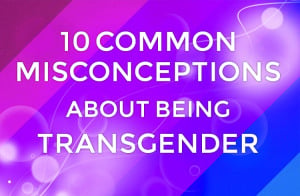Cristen: A couple of weeks ago on Ask Cristen, I tackled the question, “Should Men Have a Say in Abortion?” which left out a very important group of men who absolutely should have say in abortions – because they can get pregnant as well.
In a very cisnormative way, I failed to acknowledge the fact that uteruses and the ability to get pregnant, intentionally or unintentionally, do not exclusively belong to women. Take it from commenter cldcollector who said, “Hey, trans person here. Just because someone is assigned female at birth doesn’t necessarily mean that individual identifies as a woman. *points so self* I’m here. I’m genderqueer. I’ve also given birth to an amazing kiddo. Just sayin’.”
And thank you for sayin’.
Similarly, tuxedomarmot said, “I wish that in conversations like these, people would remember that trans people exist. Some men and non-binary people do have uteruses, and their right to abortions are also important to consider. Note that not all trans people transition or have surgeries. For starters, not all trans people have access to those things.”
While there’s no firm data on exactly how many trans men give birth every year in the US, Dr. Jennifer Kerns, who is an assistant professor of obstetrics, gynecology, and reproductive sciences at the university of California, San Francisco – that’s a long title – estimates that it’s in the thousands. And Kerns should know because she recently conducted one of, if not the, first study examining trans men’s pregnancy experiences.
The study interviewed 41 trans men – about a third of whom had gotten pregnant unintentionally, which only goes to show yet again how talking about reproductive rights, as I did, in very cisnormative and gender binary terms, excludes some people who are also “at risk” for unintended pregnancies and might face similar choices.
Regardless of whether the pregnancies were planned or unplanned, the men in that study highlighted two major difficulties with their pregnancies.
Finding adequate healthcare – because healthcare for transgender people in general is already challenging due to a lot of discrimination that happens in doctor’s offices. If you are a trans man looking for obstetric care, that can also be challenging to find a doctor who recognizes and validates the unique healthcare needs of trans men, merged with the unique healthcare needs of someone who is pregnant.
Heaped on top of that is the challenge of merely walking through the world as someone who might outwardly look like a man, but who also has a pregnant belly.
In addition to highlighting the very real and important needs for trans visibility and acceptance in our society, reading firsthand accounts of pregnancies in this study also highlighted to me, perhaps, some issues with how we tend to talk about and conceptualize motherhood and fatherhood as well in very gender binary terms that might also be exclusionary to non-gender conforming people, where mothers and fathers might not look or play the same roles as we think of them playing traditionally – and that does not at all mitigate their love and care for their children.
I just wanted to leave you with this one quote from a 29-year-old respondent to the study who said, “Pregnancy and childbirth were very male experiences for me. When I birthed my children, I was born into fatherhood.” And that sounds like a pretty incredible experience.




















